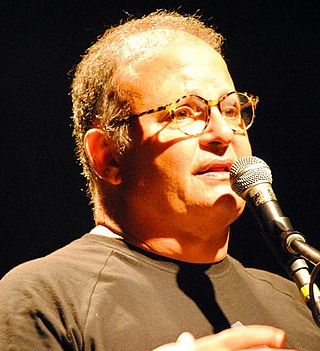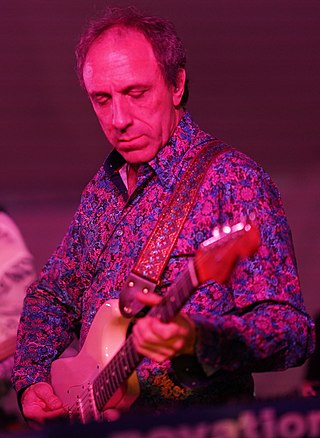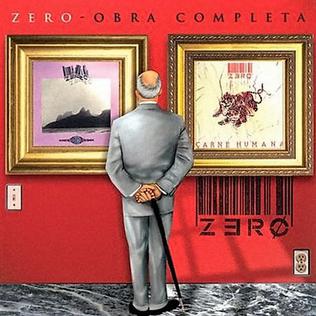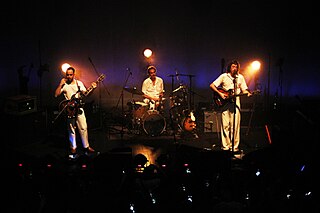
Que País É Este, subtitled 1978/1987, is the third studio album by Brazilian rock band Legião Urbana, released in 1987. The album booklet features a cartoon by drummer Marcelo Bonfá depicting the constant guitarist changes that the band went through until they hired Dado Villa-Lobos.

Titãs are a Brazilian rock band from São Paulo. Though they primarily play pop/alternative rock, their music has touched a number of other styles throughout their 40-year career, such as new wave, punk rock, grunge, MPB and electronic music.

Os Paralamas do Sucesso is a Brazilian rock band, formed in Seropédica, Rio de Janeiro, in the late 1970s. Its members since 1982 are Herbert Vianna, Bi Ribeiro (bass), and João Barone (drums). In its beginning, the band combined reggae and ska with rock, but later added horn arrangements and Latin rhythms.
Lobotomia is a Brazilian crossover thrash band from São Paulo.

Cabeça Dinossauro is the third studio album by Brazilian rock band Titãs, released on 25 June 1986. It was their first album produced by Liminha, who was the director of WEA at the time of the album's recording, which facilitated the relationship between band and label; and their first gold album, certified as such in December 1986.

Nando Reis is a Brazilian musician and producer, best known as the former bassist and one of the lead singers of Brazilian rock band Titãs and for his successful solo career, with his own band called Os Infernais. He has also produced a few albums, including some related to Cássia Eller, who has made several significant partnerships with him, and Marisa Monte. In 2012, Nando Reis was listed among the top ten Brazilian artists at the ECAD list of artists who earned the most from copyright in the first semester of that year. In 2016, he was at the 15th position, besides being 6th in the ranking of earnings from live performances and topped the ranking of earnings from music played in public places.

Guilherme Arantes is a Brazilian singer-songwriter and pianist. He is a Steinway Artist.
Cabine C was a short-lived Brazilian post-punk band from São Paulo. With their sonority inspired by acts such as Siouxsie and the Banshees, the Cure, Cocteau Twins and Talking Heads, and vocalist Ciro Pessoa's lyrics influenced by Romantic and Symbolist poets such as Edgar Allan Poe, Charles Baudelaire and Arthur Rimbaud, and by playwright Antonin Artaud, they are considered to be one of the first and most famous Brazilian gothic rock bands, as well as forerunners of the cold wave movement in Brazil.

Violeta de Outono is a Brazilian psychedelic/progressive rock band from São Paulo. Heavily influenced by The Beatles, The Rolling Stones, Pink Floyd, Led Zeppelin and Gong, they were originally a post-punk band with some psychedelic elements intertwined, but would gradually drop their post-punk influences and add more prog elements to their sonority as time went by.

Fabio Golfetti is a Brazilian musician and record producer, famous for his work with progressive/psychedelic rock band Violeta de Outono. He is also the guitarist of Franco-British rock band Gong since 2012.

Metrô is a Brazilian band formed in 1978, then known as A Gota Suspensa before renaming themselves in 1984. Beginning as a progressive rock band, they later shifted to a more synth-pop-influenced direction, becoming one of the most successful groups in the then-thriving Brazilian rock/new wave scene.

Olhar is the debut album by Brazilian band Metrô, released in 1985 by Epic Records. A critically and commercially successful album, Olhar spawned numerous hit singles which were very popular at the time of their release and are still remembered to this day, such as "Tudo Pode Mudar", "Cenas Obscenas", "Johnny Love" and "Ti Ti Ti", used as the opening theme of the eponymous telenovela which ran from 1985 to 1986. A shorter version of their 1984 hit "Beat Acelerado" is also included.
Zero, stylized in all capital letters as ZERØ, is a Brazilian rock band formed in 1983 in São Paulo and based in Rio de Janeiro since 1998, widely considered to be major forerunners of the New Romantic movement in Brazil.

Passos no Escuro is an extended play by the Brazilian rock band Zero. It came out in 1985 by EMI.

Electro-Acústico is a compilation album by Brazilian rock band Zero. Their first release in 13 years since the studio album Carne Humana, it came out in 2000 by Sony Music Entertainment. It is a compilation of electronic-influenced acoustic re-recordings of some of the band's old songs, particularly ranging from their 1985 EP Passos no Escuro to Carne Humana, plus four previously unreleased tracks. The album counts with guest appearances by Philippe Seabra of Plebe Rude and Bruno Gouveia of Biquini Cavadão.

Obra Completa is a compilation album by Brazilian rock band Zero, released in 2003 by EMI in order to celebrate the band's 20th anniversary. It is a combination of their EP Passos no Escuro and their first studio album Carne Humana, completely remastered, in one CD. The compilation is currently out of print.

Dias Melhores is a compilation album by Brazilian rock band Zero, released in 2004 by Voiceprint Records. It is composed of many songs and rarities Zero recorded during the beginning of their career, approximately between 1984 and 1985, and as such it is one of the few registers of their first ever line-up, comprising vocalist Guilherme Isnard, guitarists Fabio Golfetti and Nelson Coelho, drummer Cláudio Souza, bassist Beto Birger and saxophonist Gilles Eduar. Isnard would be the band's only founding member to remain in Zero's many different line-ups.

Quinto Elemento is the second studio album by Brazilian rock band Zero. Their first proper studio release in 20 years since Carne Humana in 1987, it was independently released on August 30, 2007. The band has uploaded early versions of each of the album's songs on their official Myspace as teasers.

"Heróis" is a single by Brazilian rock band Zero, released in 1985 by CBS Records International. It is Zero's first official release overall, and their only one to feature the band's first ever line-up, which lasted from their foundation in 1983 until circa 1985 – guitarists Fabio Golfetti and Nelson Coelho, drummer Cláudio Souza, bassist Beto Birger and saxophonist Gilles Eduar would all depart the band to form projects of their own shortly after the single's release, with the only exception of vocalist Guilherme Isnard, the only founding member of the band to remain in its many different line-ups.

O Terno is a Brazilian rock band from São Paulo, consisting of singer-songwriter Tim Bernardes, bassist Guilherme D'Almeida and drummer Gabriel Basile. Formed in 2009, the trio began performing covers of songs by Os Mutantes, The Beatles and The Kinks before releasing original music. The band is considered a fixture of the contemporary Brazilian independent music scene, being one of the founders of the independent music label Selo RISCO.

















